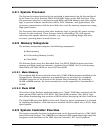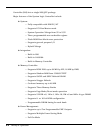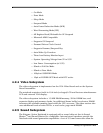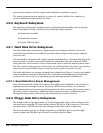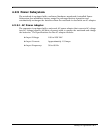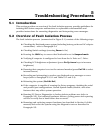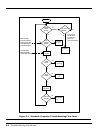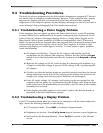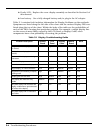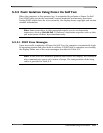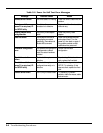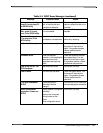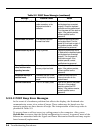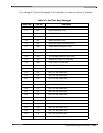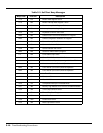
Troubleshooting Procedures 5-3
5.3 Troubleshooting Procedures
The built-in self test program and the disk resident diagnostics program (PC-Doctor)
are useful tools in computer troubleshooting. However, if the computer has a power,
keyboard or display problem, you must first solve this problem before running
diagnostics. If the computer powers up and displays messages on the LCD or emits a
series of beeps, skip to Paragraph 5.3.3 for further instructions.
5.3.1 Troubleshooting a Power Supply Problem
If the computer does not power up when the Power Switch is set to the ON position,
you most likely have a malfunction in the power subsystem (loss of power at the AC
outlet, faulty AC adapter, discharged Battery Packs, or faulty Power Supply on the
Main Board). With a power problem, all LEDs are extinguished, the LCD screen is
blank, the system does not respond when the suspend switch is pressed several times
consecutively and no drive activity can be heard. The computer is unable to load
software and displays no visible signs of activity. To fault isolate a power problem,
check the following:
♦ AC adapter and Battery - Plug in the AC adapter and double-check all
connections on the adapter and computer. Ensure that the Notebook Power
switch is set to the On position and that the system is not in Suspend or Sleep
mode.
♦ Measure the voltage at the AC outlet or plug in a known good appliance (e.g.,
a lamp) to verify that voltage is present. If the voltage is ok, try replacing the
AC adapter.
♦ Check to see that the battery packs are installed correctly and that the battery
charge indicators on the front of the battery packs indicate the batteries are
charged (try using a new battery pack if batteries are discharged).
♦
If the AC outlet voltage, AC adapter, and battery packs test normal but the
computer will not power up, try disconnecting the display cable from the base
(refer to Section 6 for disassembly instructions) to see if a short in the display
assembly has occurred.
♦ If the display assembly appears to be normal, replace the Bottom Board as
described in Section 6 and retest system.
5.3.2 Troubleshooting a Display Problem
If the LCD remains blank when you turn on the computer, and the status indicators
light, check the following controls on the display:
♦ LCD suspend mode - Press Shift to terminate Suspend mode.
♦ Brightness set too low - Press Fn-Up Arrow keys to increase screen brightness
♦ Notebook Set for External Monitor - Press Fn-F12 to switch to the internal
screen.



